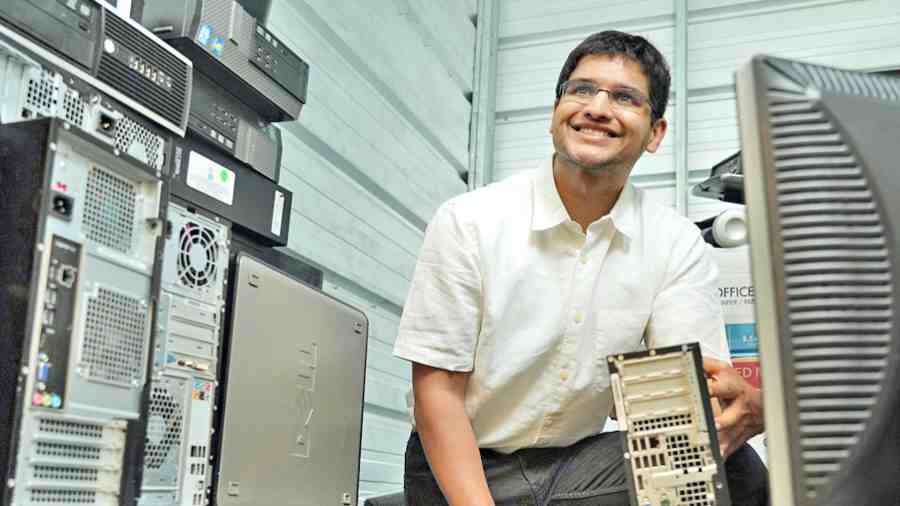Ayush Agarwal loves speech and debate. When the pandemic forced debate tournaments online during his sophomore year in high school in San Jose in the state of California in the United States, he realised what it meant to live on the other side of the digital divide.
Many of Ayush’s friends in other schools across the city didn’t have a computer or a stable Internet connection to participate in online tournaments or sessions. Then, on a Reddit debate channel, he saw postings from around the country including, ‘Hey, I need help; I can’t get into these online tournaments,’ or ‘I can’t access Zoom because my Internet’s too slow,’ Ayush, 17, said. “That, to me, was really disheartening,” he said.
“These guys are fantastic debaters. They’re probably better than me, but they simply won’t be able to attend the tournament, not because they didn’t qualify for it, but because they don’t have the capability resource wise.”
So Ayush — now a senior at Basis Independent Silicon Valley school in San Jose — decided to do something about it. In March 2021, he and three other students, from Evergreen Valley High School and Leland High School in San Jose, started a nonprofit called ClosingTheDivide, which collects used electronic devices, refurbishes them and donates them to low-income families and students.
Since its launch, the nonprofit has expanded to 29 chapters in the United States, Asia, Africa and Europe — led entirely by high school students. The students have managed to donate more than 1,145 devices; received about $32,000 in grants; collaborated with 10 sponsors and 32 corporate partners; and started 12 computer labs — six in Tanzania, one in Cambodia and five in California.
Get a focus reset
Can baseball teach us something about our short attention spans? A study of major league umpires found that they called balls and strikes more accurately during critical moments in a game. Yet immediately after these moments of intense concentration, umpires made notably more errors. (Thanks to video technology called PITCHf/x, it’s clear when they get it right and wrong.)
The good news, according to this study, is that humans can quickly reset their attention spans. No increase in errors was detected after the end of each half inning, when umpires take a two-minute break. Results would need to be replicated in classroom settings, but there is reason to think that students’ attention spans similarly deplete during the school day and that well-timed short breaks could help them. “People’s ability to pay attention is an exhaustible resource,” James E. Archsmith, an economist at the University of Maryland, US, and one of the researchers, said by email.
“We should take that into account when we’re thinking about settings where we make people focus for long periods of time without breaks. This applies both to schoolchildren and their teachers.” The study, called “The Dynamics of Inattention in the (Baseball) Field,” is currently under review for publication in an academic journal. Meanwhile, a preliminary draft has been circulated by the National Bureau of Economic Research. What is clear is that sometimes staring out the window — or zoning out in left field — may be a good idea.
Summon a Robot
Red alert, Trekkies: Starship Technologies’ robots could be delivering your next Java Chip Frappuccino. Their mission: to map out new college campuses; to seek out hangry students and save them from crowded dining halls; to boldly entertain through song and dance.
Starship, an Estonian company with headquarters in San Francisco, US, deploys fleets of autonomous robots offering contactless food delivery in locations including college campuses, a welcome service during the pandemic. The sixwheeled mini vehicles respond to mobile orders made on the Starship app, where students buy items through meal swipes or points. On 12 campuses at the start of the pandemic, Starship robots quickly took off.
The robots travel at a pace of up to 4 mph and play music when students unload the cargo bays. With a 360-degree view of their immediate surroundings, 12 cameras and a collection of radar and ultrasonic sensors, they can cross roads and maneuver around people, animals and objects.
“I really appreciate having the bot delivery available because it provides another option for accessibility,” said Alexander Cheetham, a junior and co-president of the Disabled Students’ Network at Brandeis University in Massachusetts in the US, adding that some students with disabilities may avoid dining halls when wheelchair or mobility lifts malfunction.
(New York Times News Service)











